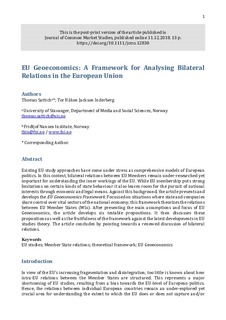| dc.contributor.author | Sattich, Thomas Michael | |
| dc.contributor.author | Inderberg, Tor Håkon | |
| dc.date.accessioned | 2019-02-26T10:20:34Z | |
| dc.date.available | 2019-02-26T10:20:34Z | |
| dc.date.created | 2019-01-19T17:07:46Z | |
| dc.date.issued | 2018-12 | |
| dc.identifier.citation | Sattich, T., Inderberg, T.H.J. (2018) EU Geoeconomics: A Framework for Analyzing Bilateral Relations in the European Union. Journal of Common Market Studies | nb_NO |
| dc.identifier.issn | 0021-9886 | |
| dc.identifier.uri | http://hdl.handle.net/11250/2587421 | |
| dc.description | This is the peer reviewed version of the following article: Sattich, T., Inderberg, T.H.J. (2018) EU Geoeconomics: A Framework for Analyzing Bilateral Relations in the European Union. Journal of Common Market Studies, DOI: 10.1111/jcms.12830, which has been published in final form at https://onlinelibrary.wiley.com/doi/epdf/10.1111/jcms.12830. This article may be used for non-commercial purposes in accordance with Wiley Terms and Conditions for Use of Self-Archived Versions. | nb_NO |
| dc.description.abstract | Existing EU study approaches have come under stress as comprehensive models of European politics. In this context, bilateral relations between EU members remain under-researched yet important for understanding the inner workings of the EU. While EU membership puts strong limitations on certain kinds of state behaviour it also leaves room for the pursuit of national interests through economic and legal means. Against this background, the article presents and develops the EU Geoeconomics Framework. Focussed on situations where state and companies share control over vital sectors of the national economy, this framework theorizes the relations between EU member states (MSs). After presenting the main assumptions and focus of EU Geoeconomics, the article develops six testable propositions. It then discusses these propositions as well as the fruitfulness of the framework against the latest developments in EU studies theory. The article concludes by pointing towards a renewed discussion of bilateral relations. | nb_NO |
| dc.language.iso | eng | nb_NO |
| dc.publisher | John Wiley & Sons, Inc. | nb_NO |
| dc.subject | EU | nb_NO |
| dc.subject | teoretisk rammeverk | nb_NO |
| dc.subject | EU studies | nb_NO |
| dc.subject | member state relations | nb_NO |
| dc.title | EU Geoeconomics: A Framework for Analyzing Bilateral Relations in the European Union | nb_NO |
| dc.type | Journal article | nb_NO |
| dc.type | Peer reviewed | nb_NO |
| dc.description.version | acceptedVersion | nb_NO |
| dc.rights.holder | © 2018 University Association for Contemporary European Studies and John Wiley & Sons Ltd. | nb_NO |
| dc.subject.nsi | VDP::Samfunnsvitenskap: 200::Økonomi: 210::Samfunnsøkonomi: 212 | nb_NO |
| dc.subject.nsi | VDP::Samfunnsvitenskap: 200::Statsvitenskap og organisasjonsteori: 240::Internasjonal politikk: 243 | nb_NO |
| dc.source.journal | Journal of Common Market Studies | nb_NO |
| dc.identifier.doi | 10.1111/jcms.12830 | |
| dc.identifier.cristin | 1660927 | |
| dc.relation.project | Norges forskningsråd: 209701 | nb_NO |
| cristin.unitcode | 217,7,5,0 | |
| cristin.unitname | Institutt for medie- og samfunnsfag | |
| cristin.ispublished | true | |
| cristin.fulltext | postprint | |
| cristin.qualitycode | 1 | |
